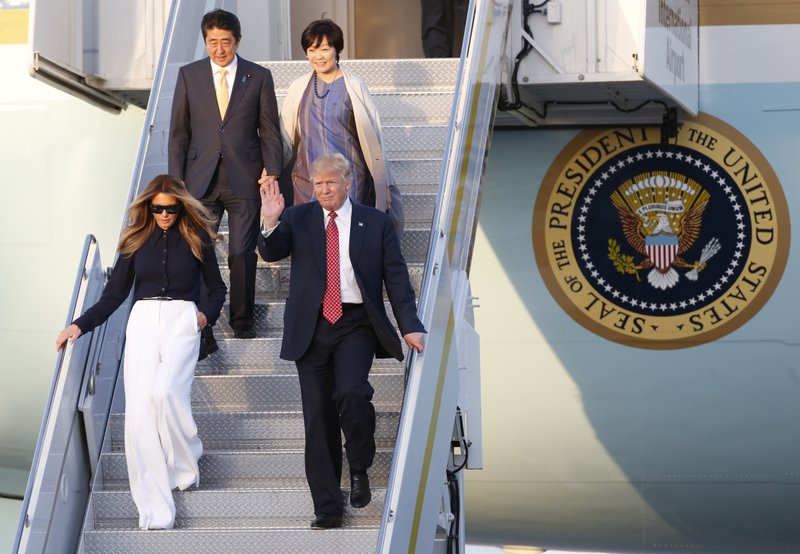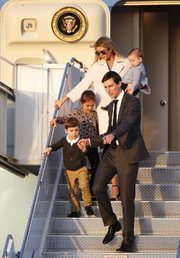WASHINGTON -- President Donald Trump said Friday that he is considering signing a "brand-new order" after his refugee and immigration travel ban was halted in court.
RELATED ARTICLES
http://www.arkansas…">Now Flynn iffy on sanction-talk timing http://www.arkansas…">Federal agents sweep up illegals http://www.arkansas…">Be aware of protests, officials urge congressmen http://www.arkansas…">Price health secretary in split-vote rerunhttp://www.arkansas…">Protesters greet DeVos' visit to D .C. public school http://www.arkansas…">Trump meets Japan's Abe in U.S. http://www.arkansas…">Slovenia offers to host Trump, Putin visit http://www.arkansas…">Trump to Israel: Settlement growth, peace don't jibe
"Ultimately, I have no doubt that we will win that particular case," Trump told reporters on Air Force One regarding the legal battle over his original directive. But he said the White House was also weighing other alternatives, including making unspecified changes to the order, which could address some of the legal issues that have arisen.
Trump did not specify what new security measures he had in mind but said he was committed to "extreme vetting" of refugees and other visitors. He said his new actions would stop people "who are looking to do harm to our country" from entering the United States.
"We'll be doing something very rapidly having to do with the additional security for our country," Trump said, standing beside visiting Prime Minister Shinzo Abe of Japan. "You'll be seeing that sometime next week."
[U.S. immigration: Data visualization of selected immigration statistics, U.S. border map]
As Trump flew to Florida for the weekend, his advisers debated their next steps after the 9th U.S. Circuit Court of Appeals upheld a restraining order on the original travel ban. The White House directive suspended the nation's refugee program and barred all entries from seven Muslim-majority countries.
A White House official initially suggested the administration would not ask the Supreme Court to overturn that order. But Chief of Staff Reince Priebus scrambled to clarify to reporters that "every single court option is on the table," including a high-court appeal or "fighting out this case on the merits" in a lower court.
Trump's executive order was unveiled at the end of his first week in office. The White House hailed the order as Trump fulfilling a campaign promise to toughen vetting procedures for people coming from countries with terrorism ties. At airports in the U.S., the order caused confusion and sparked protests.
The president has cast the order as crucial for national security.
[PRESIDENT TRUMP: Timeline, appointments, executive orders + guide to actions in first 100 days]
At the Friday news conference, Trump suggested that he had learned more about the threat of terrorism from intelligence briefings since becoming president.
"While I've been president, which is just for a very short period of time, I've learned tremendous things that you could only learn, frankly, if you were in a certain position, namely president," he said. "And there are tremendous threats to our country. We will not allow that to happen. I can tell you that right now. We will not allow that to happen."
The president's comments were far more restrained than his reaction to last week's initial court ruling blocking the travel ban. Trump took aim at both the "so-called judge" in that case and the ruling, which he called "ridiculous."
The 9th Circuit ruling represented a significant setback for Trump in just his third week in office. The appellate decision brushed aside arguments by the Justice Department that the president has the constitutional power to restrict entry to the United States and that the courts cannot second-guess his determination that such a step was needed to prevent terrorism.
Senate Minority Leader Charles Schumer tweeted that Trump "ought to see the writing on the wall" and abandon the proposal. The New York Democrat called on the president to "roll up his sleeves" and come up with "a real, bipartisan plan to keep us safe."
House Democratic leader Nancy Pelosi of California promised that "Democrats will continue to press for President Trump's dangerous and unconstitutional ban to be withdrawn." And Trump's former presidential rival Hillary Clinton offered a terse response on Twitter, noting the unanimous 9th Circuit vote: "3-0."
Congress' Republican leaders, House Speaker Paul Ryan of Wisconsin and Senate Majority Leader Mitch McConnell of Kentucky, declined to comment.
U.S. District Judge James Robart in Seattle issued the temporary restraining order halting the ban after Washington state and Minnesota sued, leading to the federal government's appeal.
The Trump administration has said the seven nations -- Iran, Iraq, Libya, Somalia, Sudan, Syria and Yemen -- have raised terrorism concerns. The states have argued that the executive order unconstitutionally blocked entry based on religion, and the travel ban harmed individuals, businesses and universities.
Trump and his aides frequently refer to a ruling by a federal judge in Boston who declined last week to extend a temporary injunction against Trump's travel ban. But it's the Seattle judge's decision that the White House has challenged.
"It's a decision that we'll win, in my opinion, very easily and, by the way, we won that decision in Boston," Trump said.
Judge: Give Evidence
Other courts across the country continued considering separate challenges to Trump's travel ban.
A federal judge in Alexandria, Va., pressed the government Friday to produce any evidence that the travel order was necessary on national security grounds.
Referring to the appeals court decision Thursday that maintained a freeze on the order, U.S. District Judge Leonie Brinkema said, "The courts have been begging you to provide some evidence, and none has been forthcoming."
The presidential order, she said, "has all kinds of defects" and "clearly is overreaching" when it comes to long-term residents of the United States. The White House has issued guidance that those residents are exempt from the ban, but that language is not actually in the order.
The only evidence provided by the government in the Virginia challenge to the ban that she was considering, she noted, was the order itself.
On the other hand, Brinkema said, "there is some strong, colorful evidence that the motivations for this order may bump into the establishment clause of the First Amendment" -- a reference to freedom of religion.
She said there was also "startling evidence" from national security professionals that the order "may be counterproductive to its stated goal" of keeping the nation safe.
Brinkema cited a letter from a bipartisan group of former high-ranking officials who warned that the ban would aid the Islamic State's propaganda efforts, endanger troops abroad and damage counterterrorism relationships.
"I don't have a scintilla of evidence from the respondents that counters this very powerful piece of evidence," Brinkema said. "Give me the evidence."
Virginia is asking for a nationwide injunction against the ban similar to that issued in Washington state and upheld by the 9th Circuit. Virginia Attorney General Mark Herring intervened in the case last week, arguing that Virginia will lose students and workers under the order.
Erez Reuveni, senior litigation counsel from the Justice Department's Office of Immigration Litigation, argued that the state had no standing to challenge the ban. The original plaintiffs in the case, Tareq and Ammar Aziz, have dropped their suit after successfully entering the United States. So has plaintiff Sahar Kamal Ahmed Fadul, who arrived at Dulles International Airport near Washington, D.C., on Tuesday.
"Virginia has a policy dispute with the president," Reuveni said. "Virginia cannot place itself in removal hearings."
While an individual affected by the ban might be able to bring a case against it, Reuveni argued that Brinkema could not review the rationale behind national security policy.
"I don't even understand how this trial would work," Reuveni said. "Could President Trump be called to testify? ... I don't think you want to go there."
Brinkema challenged that assertion. While she acknowledged that the president has the right to bar people from coming into the United States if he finds "the entry of any aliens" would be "detrimental" to the country's interests, she said the finding must have some basis.
Reuveni responded that the government, not the courts, make national security determinations. For a court to do so, he said, might be a "constitutional crisis."
But he also argued that statements Trump made "prior to taking the oath of office" should not be used to evaluate his current actions.
Information for this article was contributed by Julie Pace, Jill Colvin, Ken Thomas and Darlene Superville of The Associated Press; by Peter Baker of The New York Times; and by Rachel Weiner of The Washington Post.
A Section on 02/11/2017

